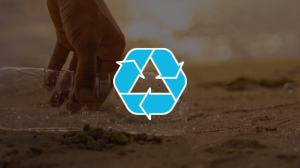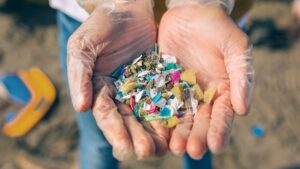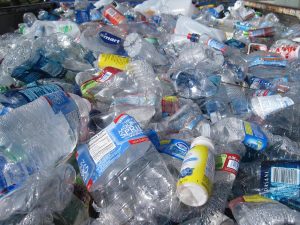Plastic straws are just the tip of the iceberg
Many corporations have stopped using plastic straws because of consumer pressure; however, plastic straws are just a minor part of the single-use plastics industry.
Full Article
by Kate Melges
Much of the stuff that accumulates during the holidays comes with single-use plastic packaging. We open a gift, rip it out of the package, and toss the plastic into a bin hoping it will get recycled and not end up polluting our oceans.
Unfortunately, the vast majority of single-use plastic is not recycled. In fact, only 9 percentof the plastics ever created have actually been recycled. And much of it ends up in our oceans. Every single minute, the equivalent of a truckload of plastic enters the ocean, harming marine life and entering seafood supply chains around the world. For a long time, corporations have tried to pass the blame and responsibility to all of us so they could continue churning out cheap throwaway packaging in the name of profit.
“Just recycle more,” they said. “Just stop littering,” they scolded.
But in 2018, people began to stand up to say enough is enough. This is the year that people around the world really began to see plastics as a problem and not a convenience. This is the year that the onus was put back on the corporations that are producing so much plastic pollution. It is their problem, not ours.
Consumer pressure has led corporations from Kroger to McDonald’s to Starbucks to Aramark to start reducing their reliance on single-use plastics. While most companies still have a lot of work to do, people have changed the conversation around plastics, highlighting the absurdity of packaging we use for a minute that lasts in our environment for lifetimes. For many companies, eliminating single-use plastic straws was the easy move in 2018, but activists know that this is just a starting point.
We must all keep the pressure on so single-use plastics are phased out across the board. Straws are just the tip of the iceberg.
It’s time for corporations in the Global North to stop polluting communities in the Global South with endless plastics. Tackling plastic pollution is a justice issue. Low-income communities are disproportionately impacted by this corporate greed, from the extraction of fossil fuels needed for production to the disposal of plastics. In 2019, the biggest players like Coca-Cola, Pepsi, Unilever, Procter & Gamble, and Nestle need to make real commitments to stop churning out throwaway plastics immediately. We know that recycling measures and infrastructure investments alone won’t fix this mess.
We simply need fewer plastics on our planet.

The unaltered stomach contents of this dead albatross chick include plastic marine debris fed to the chick by its parents. © Chris Jordan / CC BY 2.0
Tackling plastic pollution is important for so many reasons. Whether you care about the turtle with the straw in its nose, the microplastics in our drinking water, the plastic microfibers in the air we breathe, the greenhouse gases released as plastics degrade, or the fact that plastics are a lifeline for the fossil fuel industry, one thing is clear: we need to get rid of it. It’s time to close the throwaway plastics chapter for good.
Clearly, our reliance on single-use plastics stems from a culture of convenience and mass consumption. Corporations want us to buy, use something quickly, throw it away, then buy some more. The problem is that there is no such thing as ‘away’. Plastics pollute our environment for lifetimes, fragmenting into tinier microplastics that marine animals, then many of us, consume. This culture of convenience corporations have marketed is destroying our planet and our own health.

Greenpeace USA Oceans Campaign Director John Hocevar on the Hawaiian of Kaho’olawe, a sacred, protected site that still sees tonnes of plastic wash up on its shores. © Tim Aubry / Greenpeace
As we think through our 2019 resolutions this holiday season, let us all consider how we continue to get rid of the single-use plastics in our lives. But most importantly, let us plan for how we are going to demand that corporate executives and elected officials take action to get rid of single-use plastic once and for all.
We hold the power with our dollars and our votes. Let’s make sure they know that we are ready for a world without single-use plastics, and will only support leaders that intend to help build it.
Kate Melges is an oceans campaigner for Greenpeace USA.



